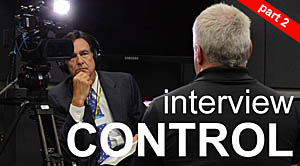


Claim Control Over Your Media Interview – Part 2
By Howard Fencl, Hennes Communications –
Blame your mom and dad. From day #1, we’re all taught that it’s polite to answer questions when we’re asked. Answer your parents’ questions. Answer your teacher’s questions. Answer your boss. So, our knee-jerk reflex when we wind up doing an interview with a reporter?
Dutifully answer the questions.
We feel an overwhelming obligation – almost a duty – to sit on the other end of a microphone and do our damnedest as the reporter fires question after question at us.
Who has control in that situation? The reporter of course. In my last post, we talked about the best way to take some control of an interview. You’ve got to prepare if you’re going to have any measure of control. Be certain you are armed with key messages. Repeat messages often throughout an interview. Brainstorm all the tough questions you anticipate and work out short, punchy answers to all of them.
But don’t stop there. Yes, it’s essential to have answers for the tough questions you anticipate, but if all you’re doing is answering questions, you’ve ceded control. So be sure to use a pivot phrase to help you circle back to one of your key messages.
Why is that so important?
Because frequent use of messages helps set context for the direction of the interview. The natural response from a reporter is to ask a follow-up question based on what they’ve just heard come out of your mouth. And if that’s one of your key messages, suddenly, control shifts in your favor.
It can feel counterintuitive to drop messages over and over again in an interview, but remember, the reporter is only going to pick a few of your answers for quotes in a story – or to drop into a video piece as a soundbite. And when the soundbite selected is one of your messages, you win.
But wait, there’s more! Here are a few more control techniques for your interview toolkit:
- Restatement
Watch Sunday morning political gabfests more closely and you’ll hear this technique used all the time, particularly in live interviews: to buy yourself a little “think time,” restate the reporter’s question. “So, let me understand this. What you’re asking is, when did I first know this was becoming an issue, is that your question?” You’re not giving a reporter a soundbite they can use – but you are giving yourself a cognitive breather so you can decide which key message you want to pivot to.
- Silence
Just because a reporter is shooting rapid-fire questions your way doesn’t mean you have to jump right in with an answer. While the tendency is to match the reporter’s pace, rushing to respond can take you down an unproductive path. Instead, take a breath or two so you have a moment to think about your best response. The reporter is not editing your silence into a news story. Just say, “let me think about that for a second,” decide your direction, and then respond.
- Set a stopping point
Negotiate the terms of your interview. Where it happens. When it happens. And most importantly, its duration. The longer a reporter keeps you talking, the more likely the chance that you’ll go down the rabbit hole and start saying things you wish you hadn’t, even with scrupulous preparation. Tell the reporter up-front that you’ve got 15 or 20 minutes on your calendar. Deputize someone from your communications team to be “bad cop” during the interview, and have them politely chime in when it’s nearing time to wrap up the interview.
- Research, research, research
Who is this reporter? What’s the approach and tone of previous stories? Do your homework so you have a better idea of the kind of reporter you’ll be dealing with. Likewise, spend time on social media researching what’s being said about your organization, about you, or about the issue at hand. What’s on your social media? Also, what is your company saying about itself on its own website? You can bet the reporter is doing this same research to come up with interview questions.
You can’t over prepare. It’s your best insurance against crashing and burning in an interview – something that will turn up in Google key word searches as long as there’s an internet. And that’s a legacy no organization wants.
—————————————–
Howard Fencl is vice-president of Hennes Communications. With decades of crisis experience under his belt and twenty years managing television newsrooms, his reputation for teaching people how to respond to the media spans the continent. To reach Howard, call 216-321-7774 or email him at info@crisiscommunications.com.
Photo Credit: Hennes Communications